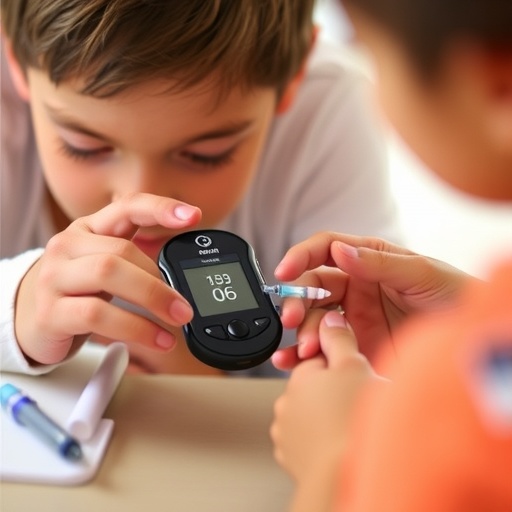In recent years, the landscape of diabetes management has been evolving rapidly, especially with the advancements in technology that facilitate better control of blood glucose levels. A significant focus of ongoing research is on the role of automated insulin delivery systems, particularly in pediatric populations newly diagnosed with Type 1 diabetes. A recent study by Yilmaz et al. sheds light on how these technological advancements can impact metabolic control in children and adolescents, opening a new frontier in diabetes care.
Type 1 diabetes is an autoimmune condition characterized by the destruction of insulin-producing beta cells in the pancreas. This leads to an absolute deficiency of insulin, which is critical for glucose metabolism. Traditionally, management of Type 1 diabetes in children has required multiple daily insulin injections or the use of insulin pumps, both of which necessitate careful monitoring of blood glucose levels. The advent of automated insulin delivery systems marks a paradigm shift in this traditional management approach.
Automated insulin delivery systems, sometimes referred to as ‘artificial pancreas’ systems, combine continuous glucose monitoring (CGM) with insulin pump technology to automatically adjust insulin delivery based on real-time blood sugar levels. These systems provide a level of precision in insulin delivery that is challenging to achieve through manual management. As a result, they offer the potential to maintain tighter glycemic control, reducing the risk of both short-term and long-term complications associated with diabetes.
The study conducted by Yilmaz and colleagues investigates the effects of initiating insulin delivery with these automated systems at the time of diagnosis. Metabolic control is crucial during this time, as the natural honeymoon phase after diagnosis can mislead caregivers regarding the adequacy of insulin doses. The study examines whether starting treatment with an automated system could lead to better metabolic outcomes compared to conventional methods.
Findings from the cohort in this research indicate a significant improvement in hemoglobin A1c (HbA1c) levels among those who started automated therapy immediately upon diagnosis. Lower HbA1c levels are associated with reduced risk of complications such as diabetic retinopathy and nephropathy, which can significantly alter a child’s quality of life and their long-term health trajectory. This suggests that prompt treatment with advanced technology right from the onset could offer long-lasting benefits.
In addition to the physiological benefits, the study also highlights the psychological and behavioral implications of adopting automated systems early in management. Children and adolescents with diabetes often face challenges related to disease burden, including anxiety and depression. The ease of use and peace of mind afforded by automated systems can promote better adherence to treatment regimens and enhance overall well-being.
Moreover, adherence is paramount because Type 1 diabetes can be an incredibly demanding condition to manage, particularly for younger patients. Automated insulin delivery mechanisms streamline the process and lessen the cognitive load required for daily management, potentially leading to improved lifestyle choices and reducing diabetes-related stress.
A notable aspect of this study is its focus on the transition and adaptation phase following diagnosis. Adjustment to diabetes can be overwhelming for patients and families. By alleviating some of this burden through automation, families may feel empowered rather than overwhelmed, which can foster resilience and a proactive approach to diabetes management.
Experts believe that real-world data from studies like this one will be crucial for informing future guidelines and best practices in diabetes care for children. As more individuals with Type 1 diabetes transition to automated systems, it will be essential for healthcare providers to understand how these interventions can be optimized based on emerging evidence.
The implications of adopting automated insulin delivery systems at diagnosis extend beyond immediate glycemic control. The potential for long-term metabolic benefits could ripple through pediatric endocrinology and general diabetes management. Children diagnosed with Type 1 diabetes today may find their outcomes significantly improved due to the innovations driving automated therapy.
In conclusion, the research conducted by Yilmaz et al. underscores the importance of timely and effective intervention for children and adolescents newly diagnosed with Type 1 diabetes. As automated technology becomes more integrated into diabetes care, it provides a glimpse into what the future could hold for young patients navigating this chronic condition. Continuous innovation and research will pave the way for better health outcomes and an improved quality of life for those living with diabetes.
The movement towards automated insulin delivery systems represents a substantial leap forward. As further evidence accumulates regarding their efficacy, including long-term follow-up studies, healthcare systems worldwide may soon see the shift in standard practices. It is imperative for parents, healthcare professionals, and policymakers to stay attuned to such developments to ensure the best possible care for the pediatric population affected by Type 1 diabetes.
As we move forward, the future of diabetes management appears promising, demonstrating the fascinating interplay between technology and healthcare. With every advancement, there is the potential to transform lives, and for children diagnosed with diabetes, these advancements can be nothing short of life-changing. Through ongoing research, advocacy, and education, we can continue to move towards a world where diabetes is not a barrier to healthy and fulfilling lives for children and adolescents.
Subject of Research: The effect of automated insulin delivery system therapy at the time of diagnosis on metabolic control in children and adolescents with Type 1 diabetes.
Article Title: Effect of Automated Insulin Delivery System Therapy at Diagnosis on Metabolic Control in Children and Adolescents with Type 1 Diabetes.
Article References:
Yilmaz, U.C., Demir, G., Özalp Kızılay, D. et al. Effect of Automated Insulin Delivery System Therapy at Diagnosis on Metabolic Control in Children and Adolescents with Type 1 Diabetes. Diabetes Ther (2025). https://doi.org/10.1007/s13300-025-01800-0
Image Credits: AI Generated
DOI:
Keywords: Automated insulin delivery, Type 1 diabetes, glycemic control, pediatric endocrinology, technology in diabetes management.




